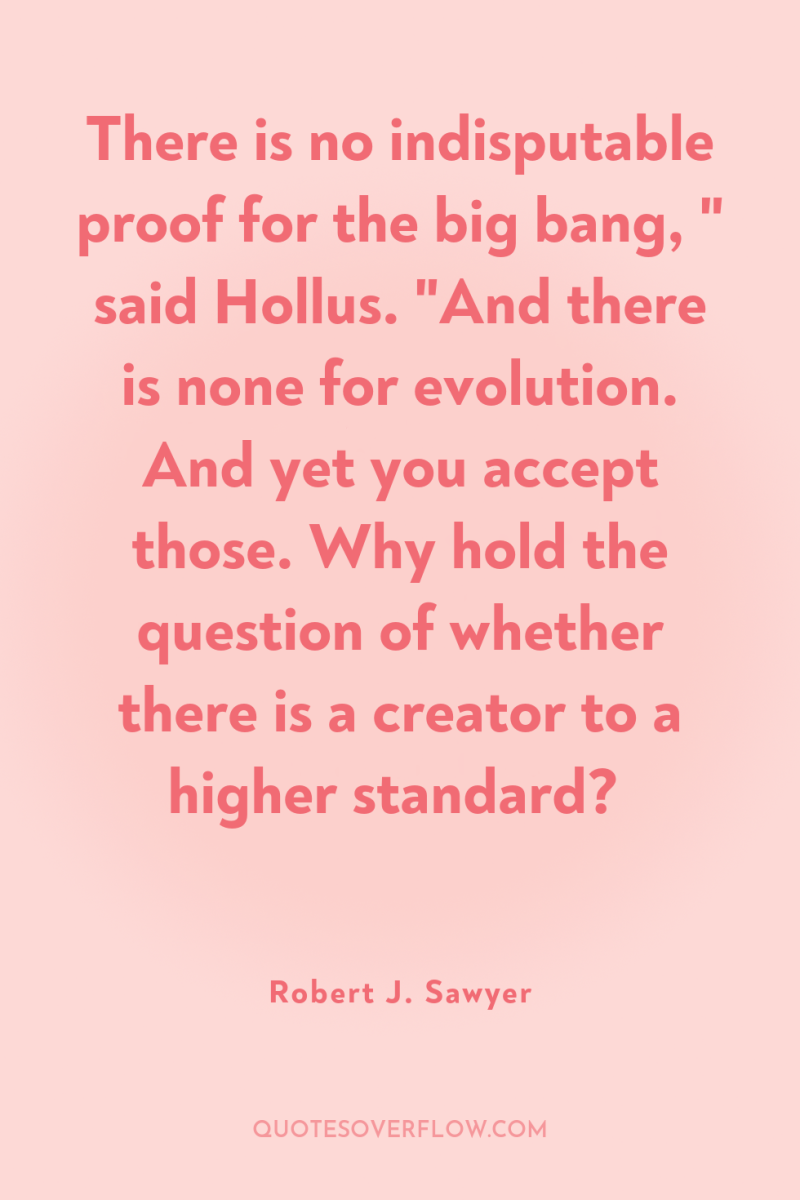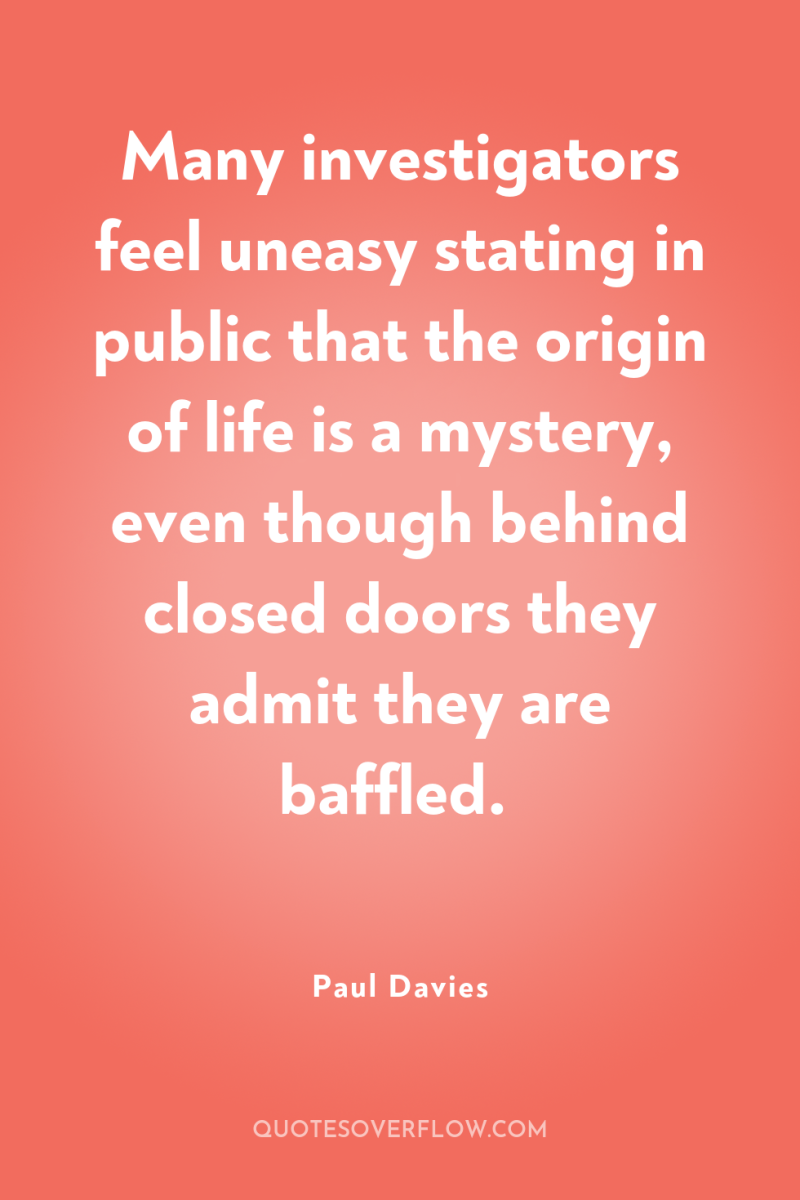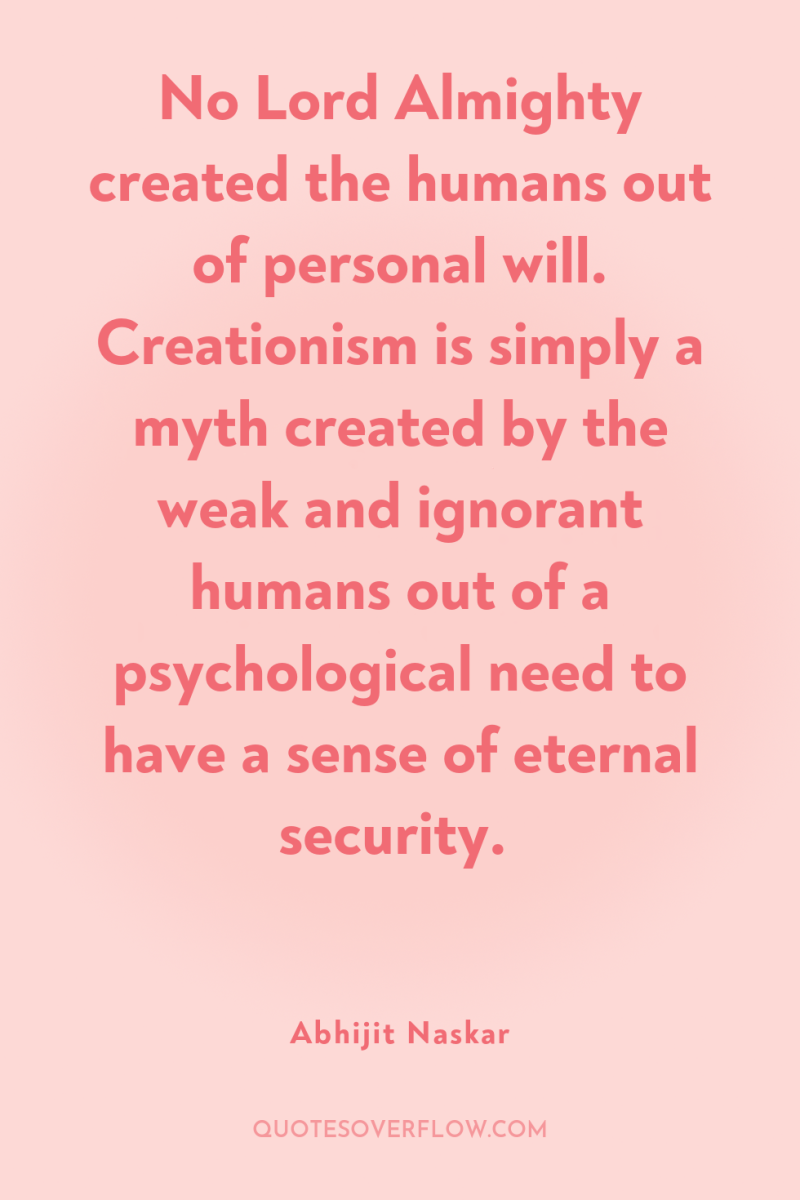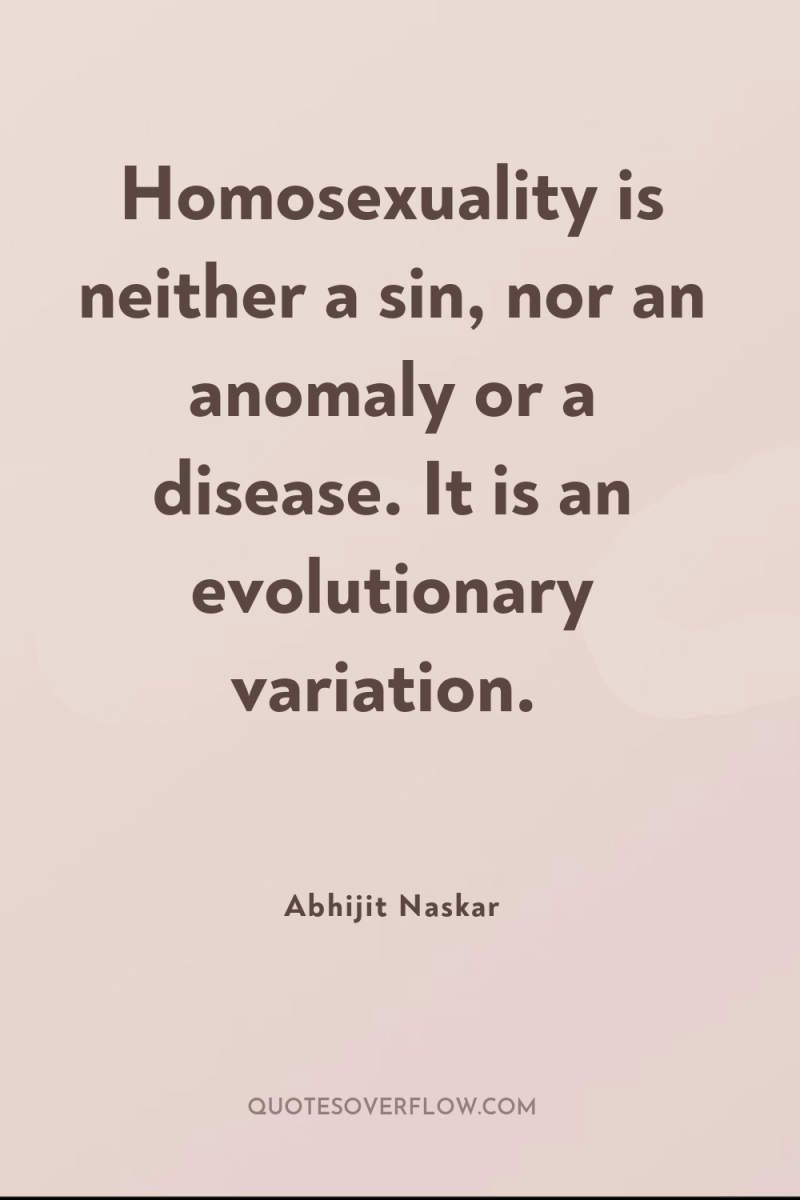
1
Shallow men believe in luck or in circumstance. Strong men believe in cause and effect.Ralph Waldo Emerson
2
Let it be admitted at once, mournful as the admission is, that every instinct in his intelligence went out at first to greet the new light. It had hardly done so, when a recollection of the opening chapter of 'Genesis' checked it at the outset.Edmund Gosse
3
A wonderful area for speculative academic work is the unknowable. These days religious subjects are in disfavor, but there are still plenty of good topics. The nature of consciousness, the workings of the brain, the origin of aggression, the origin of language, the origin of life on earth, SETI and life on other worlds..this is all great stuff. Wonderful stuff. You can argue it interminably. But it can't be contradicted, because nobody knows the answer to any of these topics.Michael Crichton
4
Evolution provides a scientific foundation for the core values shared by most Christians and conservatives, and by accepting—and embracing—the theory of evolution, Christians and conservatives strengthen their religion, their politics, and science itself. The conflict between science and religion is senseless. It is based on fears and misunderstandings rather than on facts and moral wisdom. (138).Michael Shermer

5
There is no indisputable proof for the big bang, " said Hollus. "And there is none for evolution. And yet you accept those. Why hold the question of whether there is a creator to a higher standard?Robert J. Sawyer
6
In the abstract, it might be tempting to imagine that irreducible complexity simply requires multiple simultaneous mutations - that evolution might be far chancier than we thought, but still possible. Such an appeal to brute luck can never be refuted... Luck is metaphysical speculation; scientific explanations invoke causes.Michael J. Behe
7
Random mutations much more easily debilitate genes than improve them, and that this is true even of the helpful mutations. Let me emphasize, our experience with malaria’s effects on humans (arguably our most highly studied genetic system) shows that most helpful mutations degrade genes. What’s more, as a group the mutations are incoherent, meaning that they are not adding up to some new system. They are just small changes - mostly degradative - in pre-existing, unrelated genes. The take-home lesson is that this is certainly not the kind of process we would expect to build the astonishingly elegant machinery of the cell. If random mutation plus selective pressure substantially trashes the human genome, why should we think that it would be a constructive force in the long term? There is no reason to think so.Michael J. Behe
8
To suppose that the eye with all its inimitable contrivances for adjusting the focus to different distances, for admitting different amounts of light, and for the correction of spherical and chromatic aberration, could have been formed by natural selection, seems, I confess, absurd in the highest degree.. The difficulty of believing that a perfect and complex eye could be formed by natural selection , though insuperable by our imagination, should not be considered subversive of the theory.Charles Darwin
9
I want to pause here and talk about this notion of consensus, and the rise of what has been called consensus science. I regard consensus science as an extremely pernicious development that ought to be stopped cold in its tracks. Historically, the claim of consensus has been the first refuge of scoundrels; it is a way to avoid debate by claiming that the matter is already settled. Whenever you hear the consensus of scientists agrees on something or other, reach for your wallet, because you're being had. Let's be clear: the work of science has nothing whatever to do with consensus. Consensus is the business of politics. Science, on the contrary, requires only one investigator who happens to be right, which means that he or she has results that are verifiable by reference to the real world. In science consensus is irrelevant. What is relevant is reproducible results. The greatest scientists in history are great precisely because they broke with the consensus. There is no such thing as consensus science. If it's consensus, it isn't science. If it's science, it isn't consensus. Period.Michael Crichton
10
Teaching students the evidence for and against Darwinism is not the same as teaching intelligent design. The U.S. Congress has officially endorsed teaching students 'the full range of scientific views' about Darwinian evolution.Jonathan Wells
11
Genetics might be adequate for explaining microevolution, but microevolutionary changes in gene frequency were not seen as able to turn a reptile into a mammal or to convert a fish into an amphibian. Microevolution looks at adaptations that concern the survival of the fittest, not the arrival of the fittest... The origin of species – Darwin’s problem – remains unsolved.Scott F. Gilbert
12
No fossil is buried with its birth certificate. That, and the scarcity of fossils, means that it is effectively impossible to link fossils into chains of cause and effect in any valid way.. To take a line of fossils and claim that they represent a lineage is not a scientific hypothesis that can be tested, but an assertion that carries the same validity as a bedtime story–amusing, perhaps even instructive, but not scientific.Henry Gee
13
The idea that one can go to the fossil record and expect to empirically recover an ancestor-descendant sequence, be it of species, genera, families, or whatever, has been, and continues to be, a pernicious illusion.Gareth J. Nelson
14
I would remind you to notice where the claim of consensus is invoked. Consensus is invoked only in situations where the science is not solid enough. Nobody says the consensus of scientists agrees that E=mc2. Nobody says the consensus is that the sun is 93 million miles away. It would never occur to anyone to speak that way.Michael Crichton
15
The most essential prediction of Darwinism is that, given an astronomical number of chances, unintelligent processes can make seemingly-designed systems, ones of the complexity of those found in the cell. ID specifically denies this, predicting that in the absence of intelligent input no such systems would develop. So Darwinism and ID make clear, opposite predictions of what we should find when we examine genetic results from a stupendous number of organisms that are under relentless pressure from natural selection. The recent genetic results are a stringent test. The results: 1) Darwinism’s prediction is falsified; 2) Design’s prediction is confirmed.Michael J. Behe
16
The controversy between Darwinism and intelligent design has the characteristics of major scientific revolutions in the past. Darwinists are losing power because they treat with contempt the very people on whom they depend the most: American taxpayers. The outcome of this scientific revolution will be decided by young people who have the courage to question dogmatism and follow the evidence wherever it leads.Jonathan Wells
17
If Darwinists are opposed to mentioning scientific problems with their view, you would think they would be even more opposed to mentioning intelligent design. Yet Darwinists have been discussing ID in public school science classes for years... Biology textbooks have been mentioning intelligent design since the late 1990s–but only to misrepresent and disparage it.Jonathan Wells
18
For those scientists who take it seriously, Darwinian evolution has functioned more as a philosophical belief system than as a testable scientific hypothesis. This quasi-religious function of the theory is, I think, what lies behind many of the extreme statements that you have doubtless encountered from some scientists opposing any critical analysis of neo- Darwinism in the classroom. It is also why many scientists make public statements about the theory that they would not defend privately to other scientists like me.James A. Shapiro
19
The phrase 'the fossil record' sounds impressive and authoritative. As used by some persons it becomes, as intended, intimidating, taking on the aura of esoteric truth as expounded by an elite class of specialists. But what is it, really, this fossil record? Only data in search of interpretation. All claims to the contrary that I know, and I know of several, are so much superstition.Gareth J. Nelson
20
The ideology and philosophy of neo- Darwinism which is sold by its adepts as a scientific theoretical foundation of biology seriously hampers the development of science and hides from students the field’s real problems.Vladimir L. Voeikov
21
How can we find spiritual meaning in a scientific worldview? Spirituality is a way of being in the world, a sense of one’s place in the cosmos, a relationship to that which extends beyond oneself. Does scientific explanation of the world diminish its spiritual beauty? I think not. Science and spirituality are complementary, not conflicting; additive, not detractive. Anything that generates a sense of awe may be a source of spirituality. Science does this in spades. (158-159).Michael Shermer
22
Mere lack of evidence, of course, is no reason to denounce a theory. Look at intelligent design. The fact that it is bollocks hasn’t stopped a good many people from believing in it. Darwinism itself is only supported by tons of evidence, which is a clear indication that Darwin didn’t write his books himself.Eric Idle
23
The very comprehensibility of the world points to an intelligence behind the world. Indeed, science would be impossible if our intelligence were not adapted to the intelligibility of the world. The match between our intelligence and the intelligibility of the world is no accident. Nor can it properly be attributed to natural selection, which places a premium on survival and reproduction and has no stake in truth or conscious thought. Indeed, meat-puppet robots are just fine as the output of a Darwinian evolutionary process.William A. Dembski
24
To establish evolutionary interrelatedness invariably requires exhibiting similarities between organisms. Within Darwinism, there's only one way to connect such similarities, and that's through descent with modification driven by the Darwinian mechanism. But within a design-theoretic framework, this possibility, though not precluded, is also not the only game in town. It's possible for descent with modification instead to be driven by telic processes inherent in nature (and thus by a form of design). Alternatively, it's possible that the similarities are not due to descent at all but result from a similarity of conception, just as designed objects like your TV, radio, and computer share common components because designers frequently recycle ideas and parts. Teasing apart the effects of intelligent and natural causation is one of the key questions confronting a design-theoretic research program. Unlike Darwinism, therefore, intelligent design has no immediate and easy answer to the question of common descent. Darwinists necessarily see this as a bad thing and as a regression to ignorance. From the design theorists' perspective, however, frank admissions of ignorance are much to be preferred to overconfident claims to knowledge that in the end cannot be adequately justified. Despite advertisements to the contrary, science is not a juggernaut that relentlessly pushes back the frontiers of knowledge. Rather, science is an interconnected web of theoretical and factual claims about the world that are constantly being revised and for which changes in one portion of the web can induce radical changes in another. In particular, science regularly confronts the problem of having to retract claims that it once confidently asserted.William A. Dembski
25
If it could be demonstrated that any complex organ existed, which could not possibly have been formed by numerous, successive, slight modifications, my theory would absolutely break down. But I can find no such case.Charles Darwin
26
Real arms races are run by highly intelligent, bespectacled engineers in glass offices thoughtfully designing shiny weapons on modern computers. But there's no thinking in the mud and cold of nature's trenches. At best, weapons thrown together amidst the explosions and confusion of smoky battlefields are tiny variations on old ones, held together by chewing gum. If they don't work, then something else is thrown at the enemy, including the kitchen sink - there's nothing "progressive" about that. At its usual worst, trench warfare is fought by attrition. If the enemy can be stopped or slowed by burning your own bridges and bombing your own radio towers and oil refineries, then away they go. Darwinian trench warfare does not lead to progress - it leads back to the Stone Age. .Michael J. Behe
27
Before you can ask 'Is Darwinian theory correct or not?', You have to ask the preliminary question 'Is it clear enough so that it could be correct?'. That's a very different question. One of my prevailing doctrines about Darwinian theory is 'Man, that thing is just a mess. It's like looking into a room full of smoke.' Nothing in the theory is precisely, clearly, carefully defined or delineated. It lacks all of the rigor one expects from mathematical physics, and mathematical physics lacks all the rigor one expects from mathematics. So we're talking about a gradual descent down the level of intelligibility until we reach evolutionary biology.David Berlinski
28
Even if we have a reliable criterion for detecting design, and even if that criterion tells us that biological systems are designed, it seems that determining a biological system to be designed is akin to shrugging our shoulders and saying God did it. The fear is that admitting design as an explanation will stifle scientific inquiry, that scientists will stop investigating difficult problems because they have a sufficient explanation al .William A. Dembski
29
That natural selection can produce changes within a type is disputed by no one, not even the staunchest creationist. But that it can transform one species into another – that, in fact, has never been observed.Robert J. Sawyer
30
Throughout 150 years of the science of bacteriology, there is no evidence that one species of bacteria has changed into another.. Since there is no evidence for species changes between the simplest forms of unicellular life, it is not surprising that there is no evidence for evolution from prokaryotic [i.e., bacterial] to eukaryotic [i.e., plant and animal] cells, let alone throughout the whole array of higher multicellular organisms.Alan H. Linton
31
In science's pecking order, evolutionary biology lurks somewhere near the bottom, far closer to phrenology than to physics. For evolutionary biology is a historical science, laden with history's inevitable imponderables. We evolutionary biologists cannot generate a Cretaceous Park to observe exactly what killed the dinosaurs; and, unlike "harder" scientists, we usually cannot resolve issues with a simple experiment, such as adding tube A to tube B and noting the color of the mixture.Jerry A. Coyne
32
I recently asked more than seventy eminent researchers if they would have done I their work differently if they had thought Darwin's theory was wrong. The responses were all the same: no. I also examined the outstanding biodiscoveries of the past century: the discovery of the double helix; the characterization of the ribosome: the mapping of genomes; research on medications and drug reactions: improvements in food production and sanitation; the development of new surgeries; and others. I even queried biologists working in areas where one would expect the Darwinian paradigm to have most benefited research, such as the emergence of resistance to antibiotics and pesticides. Here, as elsewhere, I found that Darwin's theory had provided no discernible guidance, but was brought in, after the breakthroughs, as an interesting narrative gloss.Philip S. Skell
33
I am absolutely convinced of the lack of true scientific evidence in favour of Darwinian dogma. Nobody in the biological sciences, medicine included, needs Darwinism at all. Darwinism is certainly needed, however, in order to pose as a philosopher, since it is primarily a worldview. And an awful one, as George Bernard Shaw used to say.Raul O. Leguizamon
34
All disciplines of science are built on the causality of the relationships governing related events. Yet the theory of evolution is built upon the idea of accidental changes that resulted in complex living systems. I was unable to comprehend how the notion that an infinite number of random accidents systematically happened to produce living species, and kept improving these beings, is justified.T.H. Janabi
35
Scientists rightly resist invoking the supernatural in scientific explanations for fear of committing a god-of-the-gaps fallacy (the fallacy of using God as a stop-gap for ignorance). Yet without some restriction on the use of chance, scientists are in danger of committing a logically equivalent fallacy-one we may call the “chance-of-the-gaps fallacy.” Chance, like God, can become a stop-gap for ignorance.William A. Dembski
36
The theory of phlogiston was an inversion of the true nature of combustion. Removing phlogiston was in reality adding oxygen, while adding phlogiston was actually removing oxygen. The theory was a total misrepresentation of reality. Phlogiston did not even exist, and yet its existence was firmly believed and the theory adhered to rigidly for nearly one hundred years throughout the eighteenth century.. As experimentation continued the properties of phlogiston became more bizarre and contradictory. But instead of questioning the existence of this mysterious substance it was made to serve more comprehensive purposes.. For the skeptic or indeed to anyone prepared to step out of the circle of Darwinian belief, it is not hard to find inversions of common sense in modern evolutionary thought which are strikingly reminiscent of the mental gymnastics of the phlogiston chemists or the medieval astronomers. To the skeptic, the proposition that the genetic programmes of higher organisms, consisting of something close to a thousand million bits of information, equivalent to the sequence of letters in a small library of one thousand volumes, containing in encoded form countless thousands of intricate algorithms controlling, specifying and ordering the growth and development of billions and billions of cells into the form of a complex organism, were composed by a purely random process is simply an affront to reason. But to the Darwinist the idea is accepted without a ripple of doubt - the paradigm takes precedence! .Michael Denton

37
Many investigators feel uneasy stating in public that the origin of life is a mystery, even though behind closed doors they admit they are baffled.Paul Davies
38
Teachers seeking to 'teach the controversy' over Darwinian evolution in today's climate will likely be met with false warnings that it is unconstitutional to say anything negative about Darwinian evolution. Students who attempt to raise questions about Darwinism, or who try to elicit from the teacher an honest answer about the status of intelligent design theory will trigger administrators' concerns about whether they stand in Constitutional jeopardy. A chilling effect on open inquiry is being felt in several states already, including Ohio. South Carolina, and Pennsylvania. [District Court] Judge Jones's message is clear: give Darwin only praise, or else face the wrath of the judiciary.David K. DeWolf

39
No Lord Almighty created the humans out of personal will. Creationism is simply a myth created by the weak and ignorant humans out of a psychological need to have a sense of eternal security.Abhijit Naskar
40
Somehow creationists keep us naturalists in track to some extent. They are the representation of human stupidity at its extreme. And we need some stupidity in the society for true intellect to be adored.Abhijit Naskar

41
Homosexuality is neither a sin, nor an anomaly or a disease. It is an evolutionary variation.Abhijit Naskar
42
Darwinism by itself did not produce the Holocaust, but without Darwinism... neither Hitler nor his Nazi followers would have had the necessary scientific underpinnings to convince themselves and their collaborators that one of the worlds greatest atrocities was really morally praiseworthy.Richard Weikart

43
Desire for beauty will endure and undermine the desire for truth.Richard O. Prum
44
His mind It says survival of the fittest but His soul Revival of the idiots So good riddance, dancingCriss Jami
45
But then arises the doubt, can the mind of man, which has, as I fully believe been developed from a mind as low as that possessed by the lowest animal, be trusted when it draws such grand conclusions?Charles Darwin
46
When it comes to society and human consciousness, Darwinism still exists in its primal message.Kat Lahr
47
Whereas modern cynicism brought despair about the ability of the human species to realize laudable ideals, postmodern cynicism doesn't – not because it's optimistic, but because it can't take ideals seriously in the first place. The prevailing attitude is Absurdism. A postmodern magazine may be irreverent, but not bitterly irreverent, for it's not purposefully irreverent; its aim is indiscriminate, because everyone is equally ridiculous. And anyway, there's no moral basis for passing judgment. Just sit back and enjoy the show.Robert Wright
48
If theft is advantageous to everyone who succeeds at it, and adultery is a good strategy, at least for males, for increasing presence in the gene pool, why do we feel they are wrong? Shouldn't the only morality that evolution produces be the kind Bill Clinton had - being sorry you got caught?Robert J. Sawyer
49
Prison is the only place, where Darwin's Theory of Evolution may seem to work. Survival of the fittest does only work, where the fittest is defined as the most loving.Raphael Zernoff
50
Materialism sets us free from sin-by proving that there is no such thing as sin. There's just antisocial behavior, which we can control with measures like laws and educational programs.Phillip E. Johnson
51
Naturalism is the view that the physical world is a self-contained system that works by blind, unbroken natural laws. Naturalism doesn't come right out and say there's nothing beyond nature. Rather, it says that nothing beyond nature could have any conceivable relevance to what happens in nature. Naturalism's answer to theism is not atheism but benign neglect. People are welcome to believe in God, though not a God who makes a difference in the natural order.William A. Dembski
52
We are going to die, and that makes us the lucky ones. Most people are never going to die because they are never going to be born.Richard Dawkins
53
We are not some casual and meaningless product of evolution. Each of us is the result of a thought of God.Pope Benedict XVI
54
But just in proportion as this process of extermination has acted on an enormous scale, so must the number of intermediate varieties, which have formerly existed, be truly enormous. Why then is not every geological formation and every stratum full of such intermediate links? Geology assuredly does not reveal any such finely graduated organic chain; and this, perhaps, is the most obvious and serious objection which can be urged against the theory. The explanation lies, as I believe, in the extreme imperfection of the geological record.Charles Darwin
55
But then with me the horrid doubt always arises whether the convictions of man's mind, which has been developed from the mind of the lower animals, are of any value or at all trustworthy. Would any one trust in the convictions of a monkey's mind, if there are any convictions in such a mind?[ To William Graham 3 July 1881]Charles Darwin
56
The many meanings of 'evolution' are frequently exploited by Darwinists to distract their critics. Eugenie Scott recommends: 'Define evolution as an issue of the history of the planet: as the way we try to understand change through time. The present is different from the past. Evolution happened, there is no debate within science as to whether it happened, and so on.. I have used this approach at the college level.' Of course, no college student–indeed, no grade-school dropout– doubts that 'the present is different from the past.' Once Scott gets them nodding in agreement, she gradually introduces them to 'The Big Idea' that all species–including monkeys and humans–are related through descent from a common ancestor.. This tactic is called 'equivocation'–changing the meaning of a term in the middle of an argument.Jonathan Wells
57
Considering the way the prebiotic soup is referred to in so many discussions of the origin of life as an already established reality, it comes as something of a shock to realize that there is absolutely no positive evidence for its existence.Michael Denton
58
As the neo-cortex of the brain keeps getting more complex through further evolution, eventually our far away progeny will born in a world where there will be no more religion to be endowed upon them.Abhijit Naskar
59
It is high time we stop using the term “theory” while mentioning Evolution. The term “theory” somehow makes some people think of Evolution as an unproven “hypothesis”. Theory of Evolution is an incontrovertible fact of science. It is not a fictitious story like Creationism. It’s a hard reality. It is the bed-rock of Biology. Defying evolution means defying one’s own existence as a human being. .Abhijit Naskar
60
Evolution is promoted by its practitioners as more than mere science. Evolution is promulgated as an ideology, a secular religion -- a full-fledged alternative to Christianity, with meaning and morality. I am an ardent evolutionist and an ex- Christian, but I must admit that in this one complaint -- and Mr. Gish [Duane T. Gish the Creation Scientist] is but one of many to make it -- the literalists are absolutely right. Evolution is a religion. This was true of evolution in the beginning, and it is true of evolution still today. .Michael Ruse
61
Indeed, not all attacks–especially the bitter and ridiculing kind leveled at Darwin–are offered in good faith, but for practical purposes it is good policy to assume that they are.Hans Selye
62
The fundamental core of contemporary Darwinism, the theory of DNA-based reproduction and evolution, is now beyond dispute among scientists. It demonstrates its power every day, contributing crucially to the explanation of planet-sized facts of geology and meteorology, through middle-sized facts of ecology and agronomy, down to the latest microscopic facts of genetic engineering. It unifies all of biology and the history of our planet into a single grand story. Like Gulliver tied down in Lilliput, it is unbudgeable, not because of some one or two huge chains of argument that might—hope against hope—have weak links in them, but because it is securely tied by hundreds of thousands of threads of evidence anchoring it to virtually every other field of knowledge. New discoveries may conceivably lead to dramatic, even 'revolutionary' shifts in the Darwinian theory, but the hope that it will be 'refuted' by some shattering breakthrough is about as reasonable as the hope that we will return to a geocentric vision and discard Copernicus.Daniel C. Dennett
63
Vehicular Darwinism based on survival of the quickest.Raymond L. Atkins
64
At some future period, not very distant as measured by centuries, the civilised races of man will almost certainly exterminate and replace throughout the world the savage races. At the same time the anthropomorphous apes, as Professor Schaaffhausen has remarked, will no doubt be exterminated. The break will then be rendered wider, for it will intervene between man in a more civilised state as we may hope, than the Caucasian and some ape as low as a baboon, instead of as at present between the negro or Australian and the gorilla.Charles Darwin
65
There is a gaping hole in the history of the Holocaust. Between Adolf Hitler and Joseph Mengele there was a hierarchy of scientists whom were responsible for writing the infamous racial legislation of the Third Reich. These scientists, doctors, and legislators enjoyed prestigious positions in the various institutions within Hitler's Germany. To be more precise, many of the ghastly experiments credited to Mengele were ordered by this group of high-ranking scientists and doctors. Mengele was following their orders, yet many of these German doctors and scientists were set free after being captured by the Allies. Previously unpublished manuscripts, correspondence, and conveniently forgotten publications reveal professional and political relationships as well as shared scientific convictions between high-profile American Progressives, British Fabian Socialists, and their German counterparts. The mounting evidence points to the long-standing designs and machinations of "scientific racism", a still poorly understood aspect of history. This book documents the hundred year trajectory of the history of "scientific racism" from its initial intentions to create "a race of masters" to the Holocaust, which resulted from Hitler's conviction to create a "master race". These scientific prejudices and political dogmas are as relevant today as they were leading up to WWII. A thorough understanding of the origins of this movement is in order. .A.E. Samaan
66
And the great difference between man and monkey is in the larynx.H.G. Wells
67
It wasn’t that we started to look at things because there was now a mechanism by which to see them. There first had to be a will to see, buried somewhere inside living things. Without it, the mechanism would never have taken shape.Unknown